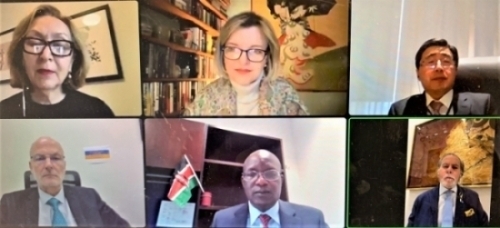石兼大使のアリアフォーミュラ30周年記念オンライン・イベント出席
令和4年3月24日

(Check against delivery)
Ms. Karin Landgren, Executive Director of Security Council Report,
Ambassador Diego Arria, Former Permanent Representative of Venezuela to the UN,
Distinguished Delegates and Participants,
I would like to begin by thanking Security Council Report for organizing this important event commemorating 30 Years of the Arria-formula Meeting Format. The Government of Japan is pleased to co-host today’s event, and warmly welcomes Ambassador Arria, for whom no explanation is needed, but who created the innovative and flexible informal meeting format that bears his name.
Indeed, Arria-formula meetings have proven to be a useful platform to discuss a variety of issues. More recently, the number of Arria-forumula meetings has been increasing and the format has developed in a manner different from what was originally envisaged, but I prefer not to go into detail as we will hear Ambassador Arria’s statement shortly after. I have no doubt that valuable information shared from outside the Security Council through “Arria-formula” has been contributing to transparency, inclusiveness, effectiveness and legitimacy in the Council’s work.
As you are aware, the Security Council is expected to meet two sometimes conflicting requirements: first, to make decisions that will ensure prompt and effective action to maintain international peace and security; and second, to gain the support of the wider United Nations membership so its decisions will be carried out. From this perspective, enhancing the transparency, efficiency and inclusiveness of the Council’s working methods is vital to the effective functioning of the Council.
Based on these beliefs, Japan has traditionally contributed to the improvement of the Council’s working methods through the Informal Working Group on Documentation and Other Procedural Questions. From 2016-2017, we chaired the IWG and led the efforts which resulted in the issuing of Note 507 by the President of the Security Council as a compilation of the Council’s working methods. I would also like to take this opportunity to commend the significant progress made by Kuwait and Saint Vincent and the Grenadines, which have worked tirelessly as subsequent Chairs of the IWG to adopt new Notes by the President.
Japan's commitment to improving working methods remains unchanged. As Ambassador Inga King from Saint Vincent and the Grenadines in her capacity as former Chair of the IWG has pointed out, Note 507 and subsequently adopted notes must be regarded as a “living document” and we must continue to take into account new trends and circumstances both in and around the Security Council to ensure that the Council’s work becomes ever more transparent and effective.
Last but not least, Japan is currently running for election as a nonpermanent member of the Security Council for the term 2023-2024, and, if elected, will make further contributions to the improvement of the Council's working methods in cooperation with all Member States.
I thank you very much.
Ambassador Diego Arria, Former Permanent Representative of Venezuela to the UN,
Distinguished Delegates and Participants,
I would like to begin by thanking Security Council Report for organizing this important event commemorating 30 Years of the Arria-formula Meeting Format. The Government of Japan is pleased to co-host today’s event, and warmly welcomes Ambassador Arria, for whom no explanation is needed, but who created the innovative and flexible informal meeting format that bears his name.
Indeed, Arria-formula meetings have proven to be a useful platform to discuss a variety of issues. More recently, the number of Arria-forumula meetings has been increasing and the format has developed in a manner different from what was originally envisaged, but I prefer not to go into detail as we will hear Ambassador Arria’s statement shortly after. I have no doubt that valuable information shared from outside the Security Council through “Arria-formula” has been contributing to transparency, inclusiveness, effectiveness and legitimacy in the Council’s work.
As you are aware, the Security Council is expected to meet two sometimes conflicting requirements: first, to make decisions that will ensure prompt and effective action to maintain international peace and security; and second, to gain the support of the wider United Nations membership so its decisions will be carried out. From this perspective, enhancing the transparency, efficiency and inclusiveness of the Council’s working methods is vital to the effective functioning of the Council.
Based on these beliefs, Japan has traditionally contributed to the improvement of the Council’s working methods through the Informal Working Group on Documentation and Other Procedural Questions. From 2016-2017, we chaired the IWG and led the efforts which resulted in the issuing of Note 507 by the President of the Security Council as a compilation of the Council’s working methods. I would also like to take this opportunity to commend the significant progress made by Kuwait and Saint Vincent and the Grenadines, which have worked tirelessly as subsequent Chairs of the IWG to adopt new Notes by the President.
Japan's commitment to improving working methods remains unchanged. As Ambassador Inga King from Saint Vincent and the Grenadines in her capacity as former Chair of the IWG has pointed out, Note 507 and subsequently adopted notes must be regarded as a “living document” and we must continue to take into account new trends and circumstances both in and around the Security Council to ensure that the Council’s work becomes ever more transparent and effective.
Last but not least, Japan is currently running for election as a nonpermanent member of the Security Council for the term 2023-2024, and, if elected, will make further contributions to the improvement of the Council's working methods in cooperation with all Member States.
I thank you very much.
